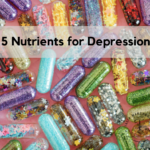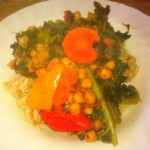 In North American society, we are conditioned to believe that we should consume 1200-1500mg of calcium a day in order to prevent osteoporosis in our later years. Parents feel they are unfit if they do not forcefeed their children 3 servings of dairy products (almost a litre of milk) a day!
In North American society, we are conditioned to believe that we should consume 1200-1500mg of calcium a day in order to prevent osteoporosis in our later years. Parents feel they are unfit if they do not forcefeed their children 3 servings of dairy products (almost a litre of milk) a day!
However, epidemiological studies investigating Asian countries found that the populations who consumed zero dairy products, and had very low calcium intake, had 1/4 the risk of osteoporosis of North America. Now, it might be argued that the reduced risk of osteoporosis is due to genetics. However, the studies showed that when Asian women immigrate to North America and adopt the North American diet and lifestyle, their risk of osteoporosis and risk fractures rises to that of the North American population.
Studies show that, while calcium has been correlated with lower risk of osteoporosis, once you achieve a daily intake of about 400mg, adding more achieves no further benefit. 400mg can be achieved by consuming leafy green vegetables or one serving or dairy product (or a fortified replacement) a day. However, maintaining healthy bones is about more than simply getting enough calcium in your diet.
Our second year nutrition professor outlines a naturopathic strategy for reducing the risk of osteoporosis and bone fractures by minimizing bone mineral density loss:
– Consume leafy greens and either one serving of dairy product a day, or a dairy replacement (or 100 mg calcium-magnesium supplement) that is fortified with calcium.
– Consume an alkaline diet – a diet that is high in vegetables and contains a moderate amount of meat products and low intake of caffeine. Studies show that diets that are low in fruits and vegetables and contain large amounts of animal protein and caffeine create an acidic environment in the body. Because the body needs to maintain its acidity within a certain range, calcium is taken from bones to buffer the acidity and raise the pH to optimal levels. The result is a loss of bone density over time.
– Ensure adequate vitamin D intake. Taking supplemental vitamin D in the winter is advised, as North Americans receive little sun exposure during the colder months. It is important to get at least 400 IU of vitamin D3 a day in order to prevent bone mineral density loss.
– Increase the amount of daily weight-bearing exercise. Women who engaged in weight-bearing exercise (standing up, walking or weight-lifting) a few times a week experienced lower rates of bone mineral density loss.
– Other supplements: magnesium, strontium, vitamin K, boron, zinc, manganese, copper, and isoflavones from soy or red clover have all shown to have a positive effect on bone mineral density, especially when combined with adequate calcium, vitamin D and weight-bearing exercise.
*This article does not substitute the medical advice of a licensed naturopathic doctor.








our bone density is reduced as we get older, we should always take calcium supplements..
Our very own web portal
http://www.healthmedicinecentral.com/depth-perception-test/
Unfortunately I disagree. Supplementing with only calcium can increase the risk of CV disease, although the evidence is not conclusive. I would also refrain from the word “always” in medicine. Most calcium can be obtained from diet and, in cases where supplementation is necessary, it should be done with vitamin D, magnesium and, now research is pointing to vitamin K2 as well, with instructions to engage in weight-bearing exercise daily. Unfortunately, supplementing with just calcium is outdated and potentially harmful, and the daily recommended intakes are inflated when we compare bone density in NA to that of East Asia, where calcium supplementation and dairy intake is non-existent.